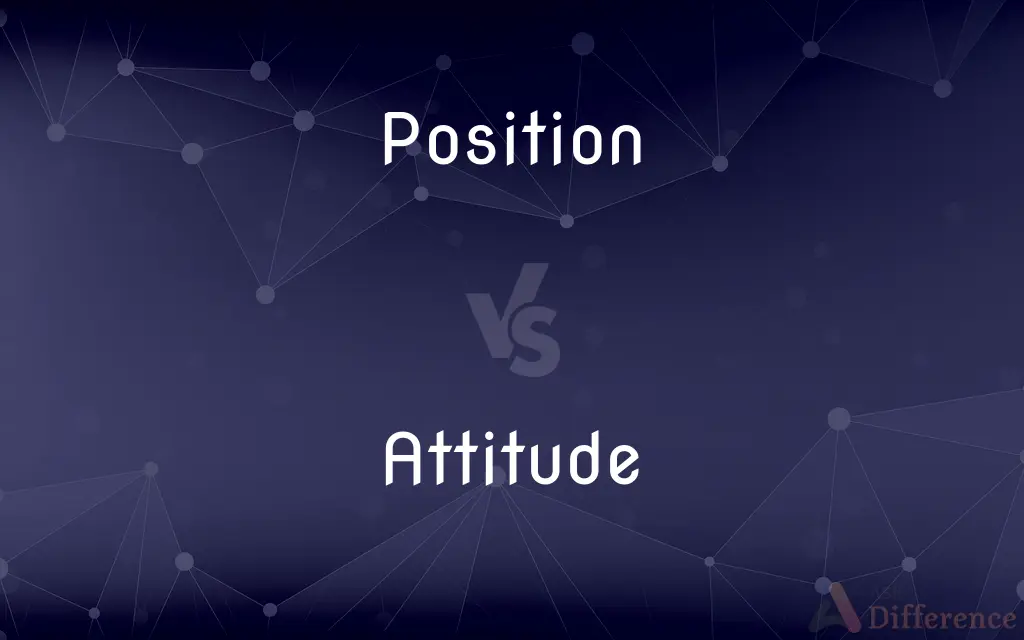Position vs. Attitude — What's the Difference?
Edited by Tayyaba Rehman — By Maham Liaqat — Updated on March 26, 2024
Position refers to an object's location or a stance on an issue, while attitude denotes an individual's feelings or viewpoints toward a subject or situation.

Difference Between Position and Attitude
Table of Contents
ADVERTISEMENT
Key Differences
Position often describes a physical place where something or someone is located, or it can signify one's stance on a particular matter. For instance, a person's position in a debate might be in favor of or against a certain policy. On the other hand, attitude refers to a person's inner thoughts and feelings about an object, person, or situation. This can include a wide range of emotions and perceptions, from positive to negative.
While position can be objectively measured or stated in terms of coordinates or alignment with certain ideas, attitude is more subjective, reflecting personal beliefs, emotions, and reactions. For example, someone's position on a map is a fixed point, whereas their attitude towards a destination can vary based on past experiences or expectations.
Positions can change over time or with new information, especially in the context of opinions or stances on issues. Changing one's position can be a result of new evidence or persuasive arguments. Attitudes also evolve, but they are often influenced by personal experiences, cultural background, and emotional factors, making them potentially more stable or more volatile over time.
In professional or organizational contexts, a position may refer to a job role or title, defining a set of responsibilities and the place within a hierarchical structure. Conversely, an individual's attitude in the workplace can significantly impact team dynamics, productivity, and the overall work environment, regardless of their official position.
Understanding the difference between position and attitude is crucial in various fields, including psychology, sociology, and communication studies. Recognizing that positions can be discussed and negotiated while attitudes might require more nuanced approaches to change or understand, is key in both personal and professional interactions.
ADVERTISEMENT
Comparison Chart
Definition
Location or stance on an issue
Individual’s feelings or viewpoints
Nature
Objective or can be stated
Subjective and internal
Stability
Can change with new information or perspectives
Influenced by experiences, more stable or volatile
Professional Context
Refers to job role or title
Impacts team dynamics and productivity
Measurement
Can be measured or described objectively
Evaluated through expressions, actions, or psychological tools
Compare with Definitions
Position
A situation or set of circumstances, especially in a financial or social context.
After the market crash, many investors found themselves in a difficult position.
Attitude
A settled way of thinking or feeling about something, typically reflected in a person's behavior.
Her positive attitude towards work inspired her colleagues.
Position
A particular way in which someone or something is placed or arranged.
She adjusted the position of the chairs to have a better view of the screen.
Attitude
Position of aircraft or spacecraft relative to a frame of reference (the horizon or direction of motion)
Position
A person's rank or status within a hierarchy or organization.
He held the position of manager for over a decade.
Attitude
A position of the body proper to or implying an action or mental state.
The dancer's attitude was poised and elegant.
Position
An opinion or stance taken on a specific issue.
The senator made it clear that her position on climate change was non-negotiable.
Attitude
An arrogant or hostile state of mind or disposition.
He was warned to adjust his attitude if he wanted to stay on the team.
Position
A place where someone or something is located or has been put.
The GPS system indicated the car's position was two miles away from the destination.
Attitude
A complex mental state involving beliefs and feelings and values and dispositions to act in certain ways.
Changing public attitudes about smoking has been a major public health achievement.
Position
A place or location.
Attitude
A settled way of thinking or feeling about something
He was questioned on his attitude to South Africa
Being competitive is an attitude of mind
Position
The right or appropriate place
The bands are in position for the parade's start.
Attitude
Truculent or uncooperative behaviour
I asked the waiter for a clean fork and all I got was attitude
Position
A strategic area occupied by members of a force
The troops took up positions along the river.
Attitude
The orientation of an aircraft or spacecraft, relative to the direction of travel.
Position
The way in which something is placed
The position of the clock's hands.
Attitude
A manner of thinking, feeling, or behaving that reflects a state of mind or disposition
Has a positive attitude about work.
Kept a dignified attitude throughout the crisis.
Position
The arrangement of body parts; posture
A standing position.
Attitude
Arrogant or aggressive disposition or behavior
One customer with a lot of attitude really tried my patience.
Position
In ballet, any of the five arrangements of the arms and feet in which the legs are turned out from the pelvis.
Attitude
A position of the body or manner of carrying oneself
Stood in a graceful attitude.
Position
An advantageous place or location
Jockeys maneuvering for position.
Attitude
A position similar to an arabesque in which a ballet dancer stands on one leg with the other raised either in front or in back and bent at the knee.
Position
A situation as it relates to the surrounding circumstances
In a position to bargain.
Attitude
The orientation of an aircraft's axes relative to a reference line or plane, such as the horizon.
Position
A point of view or attitude on a certain question
The mayor's position on taxes.
Attitude
The orientation of a spacecraft relative to its direction of motion.
Position
Social standing or status; rank.
Attitude
The position of the body or way of carrying oneself.
The ballet dancer walked with a graceful attitude.
Position
A post of employment; a job.
Attitude
(figurative) Disposition or state of mind.
Don't give me your negative attitude.
You've got a nice attitude today.
Position
(Sports) The area for which a particular player is responsible.
Attitude
Unpleasant behavior.
He doesn't take attitude from anybody.
I asked the waiter for a clean fork and all I got was attitude.
Position
The arrangement of the pieces or cards at any particular time in a game such as chess, checkers, or bridge.
Attitude
The orientation of a vehicle or other object relative to the horizon, direction of motion, other objects, etc.
The airliner had to land with a nose-up attitude after the incident.
Position
The act or process of positing.
Attitude
(ballet) A position similar to arabesque, but with the raised leg bent at the knee.
Position
A principle or proposition posited.
Attitude
To assume or to place in a particular position or orientation; to pose.
Position
A commitment to buy or sell a given amount of securities or commodities.
Attitude
To express an attitude through one's posture, bearing, tone of voice, etc.
Position
The amount of securities or commodities held by a person, firm, or institution.
Attitude
The posture, action, or disposition of a figure or a statue.
Position
The ownership status of a person's or institution's investments.
Attitude
The posture or position of a person or an animal, or the manner in which the parts of his body are disposed; position assumed or studied to serve a purpose; as, a threatening attitude; an attitude of entreaty.
Position
To put in place or position.
Attitude
Fig.: Position as indicating action, feeling, or mood; as, in times of trouble let a nation preserve a firm attitude; one's mental attitude in respect to religion.
The attitude of the country was rapidly changing.
'T is business of a painter in his choice of attitudes (posituræ) to foresee the effect and harmony of the lights and shadows.
Never to keep the body in the same posture half an hour at a time.
Position
To determine the position of; locate.
Attitude
A complex mental state involving beliefs and feelings and values and dispositions to act in certain ways;
He had the attitude that work was fun
Position
A place or location.
Attitude
Position or arrangement of the body and its limbs;
He assumed an attitude of surrender
Position
A post of employment; a job.
Attitude
A theatrical pose created for effect;
The actor struck just the right attitude
Position
A status or rank.
Chief of Staff is the second-highest position in the army.
Position
An opinion, stand, or stance.
My position on this issue is unchanged.
Position
A posture.
Stand in this position, with your arms at your side.
Position
(figurative) A situation suitable to perform some action.
The school is not in a position to provide day-care after 4:00 pm.
Position
(team sports) A place on the playing field, together with a set of duties, assigned to a player.
Stop running all over the field and play your position!
Position
(finance) An amount of securities, commodities, or other financial instruments held by a person, firm, or institution.
Long position
Naked position
Position
(finance) A commitment, or a group of commitments, such as options or futures, to buy or sell a given amount of financial instruments, such as securities, currencies or commodities, for a given price.
Position
(arithmetic) A method of solving a problem by one or two suppositions; also called the rule of trial and error.
Position
(chess) The full state of a chess game at any given turn.
Position
(poker) The order in which players are seated around the table.
Position
To put into place.
Position
The state of being posited, or placed; the manner in which anything is placed; attitude; condition; as, a firm, an inclined, or an upright position.
We have different prospects of the same thing, according to our different positions to it.
Position
The spot where a person or thing is placed or takes a place; site; place; station; situation; as, the position of man in creation; the fleet changed its position.
Position
Hence: The ground which any one takes in an argument or controversy; the point of view from which any one proceeds to a discussion; also, a principle laid down as the basis of reasoning; a proposition; a thesis; as, to define one's position; to appear in a false position.
Let not the proof of any position depend on the positions that follow, but always on those which go before.
Position
Relative place or standing; social or official rank; as, a person of position; hence, office; post; as, to lose one's position.
Position
A method of solving a problem by one or two suppositions; - called also the rule of trial and error.
Position
To indicate the position of; to place.
Position
The particular portion of space occupied by a physical object;
He put the lamp back in its place
Position
A point occupied by troops for tactical reasons
Position
A way of regarding situations or topics etc.;
Consider what follows from the positivist view
Position
Position or arrangement of the body and its limbs;
He assumed an attitude of surrender
Position
The relative position or standing of things or especially persons in a society;
He had the status of a minor
The novel attained the status of a classic
Atheists do not enjoy a favorable position in American life
Position
A job in an organization;
He occupied a post in the treasury
Position
The spatial property of a place where or way in which something is situated;
The position of the hands on the clock
He specified the spatial relations of every piece of furniture on the stage
Position
The appropriate or customary location;
The cars were in position
Position
(in team sports) the role assigned to an individual player;
What position does he play?
Position
The act of putting something in a certain place or location
Position
A condition or position in which you find yourself;
The unpleasant situation (or position) of having to choose between two evils
Found herself in a very fortunate situation
Position
An item on a list or in a sequence;
In the second place
Moved from third to fifth position
Position
A rationalized mental attitude
Position
An opinion that is held in opposition to another in an argument or dispute;
There are two sides to every question
Position
The function or position properly or customarily occupied or served by another;
Can you go in my stead?
Took his place
In lieu of
Position
The act of positing; an assumption taken as a postulate or axiom
Position
Cause to be in an appropriate place, state, or relation
Position
Put into a certain place or abstract location;
Put your things here
Set the tray down
Set the dogs on the scent of the missing children
Place emphasis on a certain point
Common Curiosities
Can attitude be measured?
Attitudes can be evaluated through observations of expressions, actions, or using psychological assessment tools.
Can positions change?
Yes, positions can change with new information, perspectives, or over time.
Are attitudes stable?
Attitudes can be more stable or volatile, influenced by personal experiences and emotional factors.
Can attitudes be changed?
Yes, attitudes can change, often through personal experiences or exposure to new information.
How does one's position relate to their attitude?
One's position on an issue may influence their attitude towards it, but the two are distinct concepts.
How can attitudes be assessed in a workplace?
Through surveys, performance reviews, and observing behavior and interactions.
How does attitude affect the workplace?
An individual's attitude can significantly influence team dynamics, productivity, and the overall atmosphere.
What role does culture play in shaping attitudes?
Culture significantly influences attitudes by shaping beliefs, values, and norms.
Does a change in position always affect attitude?
Not always, but a change in position can influence one's attitude, depending on the context and individual.
What is the difference between position and attitude?
Position can refer to a physical location or a viewpoint on an issue, whereas attitude is about a person's feelings or opinions towards something.
What is a professional position?
A professional position refers to a job title and the associated responsibilities within an organization.
Is position always physical?
No, position can also refer to someone's stance on an issue or their role within an organization.
Why is understanding attitudes important in marketing?
Understanding attitudes is crucial for effective marketing to tailor messages and products to consumer preferences.
How does someone's attitude impact their decision-making?
Attitude can impact decision-making by affecting how information is perceived and the willingness to change or consider alternatives.
How do position and attitude contribute to leadership?
Effective leadership requires a clear position on key issues and a positive attitude to inspire and guide others.
Share Your Discovery

Previous Comparison
Tutorial vs. Tuition
Next Comparison
Takeout vs. TakeawayAuthor Spotlight
Written by
Maham LiaqatEdited by
Tayyaba RehmanTayyaba Rehman is a distinguished writer, currently serving as a primary contributor to askdifference.com. As a researcher in semantics and etymology, Tayyaba's passion for the complexity of languages and their distinctions has found a perfect home on the platform. Tayyaba delves into the intricacies of language, distinguishing between commonly confused words and phrases, thereby providing clarity for readers worldwide.
















































